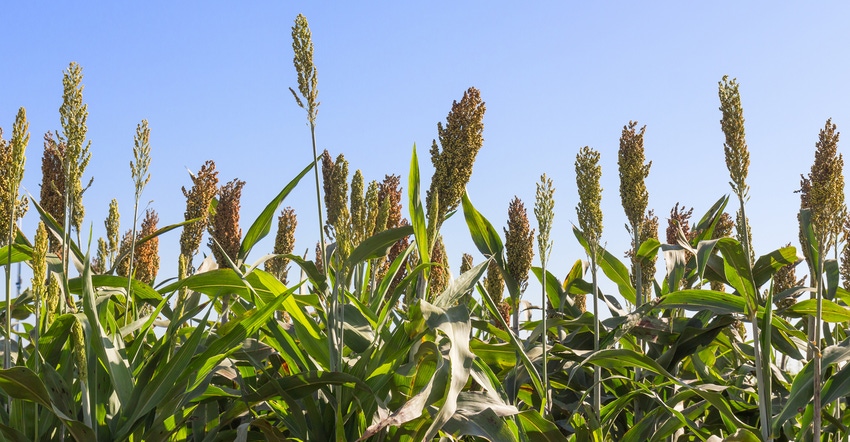
Farmers in a wide swath of the Midwest, including more than half of the counties in Kansas, are fighting a late, wet spring. Even in areas that aren’t standing in water, raising concerns about what will get planted — or won’t — for 2019.
With the deadline for insuring a corn crop past, farmers who don’t have seed in the ground are looking at prevented planting insurance or what to plant instead when the water finally goes down. One option the National Sorghum Producers is recommending producers take a long look at some variety of sorghum.
“I still have plenty of time to plant milo or soybeans,” says Sedgwick County farmer Mick Rausch, who farms near Garden Plain and also works an off-farm job maintaining township roads, a job that has been especially difficult this spring.
Grain sorghum is expected to gain significant acres in much of flood country in south-central Kansas, where it is already a popular rotation crop with wheat and cotton. Like soybeans, it can be planted later in than other crops. It is also drought tolerant, making it a lower risk option than beans.
Seed costs are also less, according to NSP.
For example, sorghum seed typically costs $9 to $18 per acre depending on seeding rate, while corn seed typically costs $55 to $110 an acre depending on seeding rate and traits. Soybean seed can be as high as $62 per acre with added costs if seed treatments are needed — which they usually are in cool, wet conditions.
Harvest costs are often lower for sorghum, as well.
Another advantage is that sorghum is interchangeable with corn as a seedstock for making ethanol. With corn acres down substantially, ethanol plants are likely to be looking at alternatives. Rausch says he expects demand to be high for ethanol, especially because the price of corn in a time of shortages is likely to go up.
“Grain sorghum provides a number of benefits to growers as we enter a replant and late/prevent plant time period for the 2019 growing season,” says Brent Bean, Sorghum Checkoff agronomist, Ph.D. “There is typically a yield benefit for soybeans, cotton and corn when planted after sorghum. In addition, its root system is often able to penetrate compacted soils and can reduce diseases and nematodes that plague other crops.”
NSP CEO Tim Lust says the market for sorghum looks good in spite of the ongoing trade war with China that has drastically cut sales to U.S. sorghum’s biggest customer. He expressed optimism that recent sales of multiple vessels to China means the country will buy sorghum in spite of the tariffs.
“Despite trade uncertainty, demand for feed grain remains strong across the globe,” Lust says. “Furthermore, anticipated feed grain shortages from areas impacted by adverse planting weather will create significant localized demand for additional starch sources like sorghum. We continue to receive feedback from ethanol plants and other end-users about the need to fill gaps in supply this winter. Some have already posted sorghum bids, and others are strongly considering doing so.”
The Market Facilitation Program also factors in planting decision. USDA has indicated that growers must plant a program crop or alfalfa in order to collect a payment. Growers can get final plant dates for crop insurance coverage from their local insurance agent.
NSP says growers who plan to take a prevented planting insurance payment should consider planting sorghum as a cover crop. Resources on this provision are available from the USDA Risk Management Agency.
Additional agronomic and marketing resources, including information on "Sorghum Management Following a Wet Winter and Spring," "Pre-emergence Weed Control," "Fertilizing Grain Sorghum," "Seeding Rate," sorghum marketing connections and Sorghum Checkoff marketing staff are available at sorghumcheckoff.com.
For information on local bids or additional information, producers can contact National Sorghum producers at 800-658-9808.
This article contains material provided by the National Sorghum Producers.
About the Author(s)
You May Also Like






